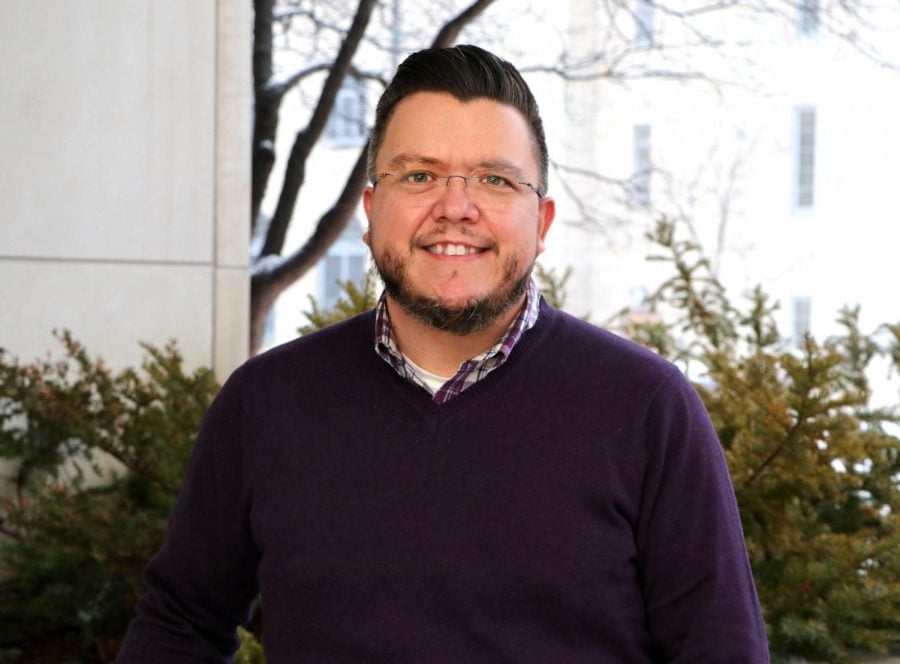Garrett Gilmer starts as new executive director of CAPS, talks inclusion
The new executive director of CAPS hopes to improve access to mental health services through open dialogue and a social justice framework.
February 16, 2021
Northwestern Counseling and Psychological Services has a new executive director, Garrett Gilmer, who said he plans to emphasize inclusion and accessibility in his role.
Support starts with listening and trying to form a partnership with students, Gilmer said. He acknowledged that trust is a process and is especially challenging in a remote environment.
“His student-centered approach, along with his aim to ensure an equitable experience for all, aligns with the core values of (AccessibleNU) and (Dean of Students Office) and we are absolutely thrilled to begin this new partnership,” Associate Dean of Students and Director of AccessibleNU Jill Sieben-Schneider wrote in an email to The Daily.
Gilmer comes to NU directly from Bowling Green State University, where he worked as director of the counseling center.
Gilmer started the position two weeks ago, as students and faculty were hearing about alleged sexual harassment and racial discrimination in the NU cheer program. Gilmer said CAPS staff members were made aware of the news and prepared to meet with students accordingly.
“People are questioning, ‘Should I trust Northwestern? Should I trust these messages?’” Gilmer said, in reference to recent University-wide emails referring students to CAPS. “We have a responsibility to attend to the mental health of the entire student body.”
Several staff members involved in Garrett’s hiring said they were impressed by his experience and commitment to social justice.
“I think he’s starting in a moment of a lot of opportunities,” said Fabiola Montiel, who directs clinical services for CAPS Chicago and previously held the interim director position.
Gilmer said social justice must go beyond values and dialogue, and could include fundamentally examining NU’s mental health system to make sure it works for everyone. He also acknowledged significant feedback from students who were concerned with the accessibility of CAPS, a lack of responsiveness and a sense that CAPS leans too heavily on external referrals.
In the past, students have criticized long wait times for appointments, alleging a relationship between inaccessibility of services and perennial staffing and funding shortages for CAPS.
The University reported a $60-plus million surplus at the start of 2020, which allowed CAPS to hire five new staff members — three for the Chicago campus and two sports psychologists, who will work specifically with student-athletes, according to Gilmer. In times when resources are tight, Gilmer said there are still ways to prioritize availability to students, such as reducing the number of staff meetings and looking into creating more group counseling sessions.
Gilmer encouraged students to reach out directly to him if they’re having trouble accessing CAPS services.
CAPS is also looking to hire a new liaison to Latinx students to replace Rosemary Magana, who left the position last year. Currently, staff psychologist Kenneth Washington serves as a liaison to Black students, and Sabaahath Latifi was recently hired as the first-ever Muslim counselor at CAPS.
Garrett said these roles help break down the emotional and institutional barriers that have historically kept marginalized students from mental health services.
Often, Gilmer said the services haven’t been set up for students of color.
Gilmer emphasized that he’s not afraid to dismantle and “eradicate” systems that perpetuate social injustice.
“Often it means we have to replace and create new systems,” he said. “When folks are saying, ‘Hey, it’s not working for me,’ you have to just start with the assumption it’s not working for them.”
In some ways, Gilmer said his commitment to social justice stems from his own identities as a gay man with Mexican-American and European-American ancestry. Growing up, Gilmer said he sometimes downplayed the Mexican part of his identity, missing out on key values and culture until he engaged with them later in life. At the same time, Gilmer has tried to work through the privilege associated with his identity as a man, especially since he said he appears as a white man to many people.
That process is difficult, and he has tried to confront his mistakes head-on and with honesty, Gilmer said.
Just two weeks into his new role, Gilmer has already started working with campus partners and engaging in informal conversations with students. By building up a network of trust, Gilmer hopes to reach students who have previously felt alienated by mental health services.
“I’m so excited and super honored to be here,” Gilmer said. “It is very humbling.”
Email: [email protected]
Twitter: @sightsonwheels
Related Stories:
— CAPS hires first Muslim counselor as a result of student advocacy
— CAPS transitions to remote services, provides workshops for out of state students
— CAPS set to hire five new counselors for this academic year












